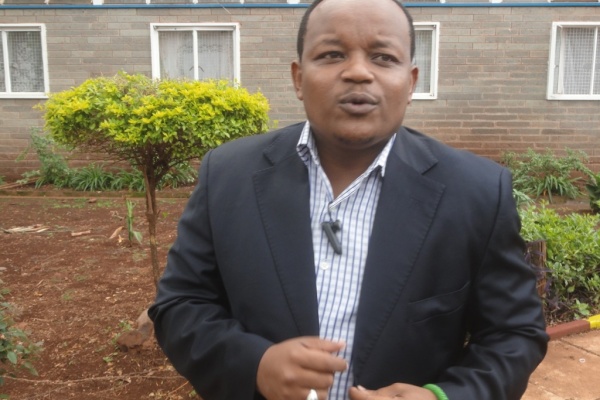It is hard to forget the loud, sycophantic sentiments of Dr. David Nkekorach Matsanga, the dramatic Ugandan who made it his business to defend President Uhuru Kenyatta and Deputy President William Ruto and by extension Kenya, against the ‘ills’ of the ICC. Perhaps a clever schemer in the Jubilee administration, hired to make the life of anyone perceived to support the ICC a living hell, came to the realisation that Kenyans had become tired of listening to Matsanga’s shouting.
This explains the change in tact. Introduce a new personality to defend Kenya against the ICC and pit brother against brother and scuttle civil society by causing divisions. Tear down the ‘evil society’ from within. It’s an almost brilliant plan, but ‘almost’ does not count.
New Kid on the Block
Ngunjiri Wambugu, under the outfit Kikuyus for Change, raised his profile by leading the pro-ICC campaign, helping other civil society organisations to collect 1 million signatures in support of the ICC. Through this act and many of his articles, Ngunjiri was seen to be a strong proponent of the ICC.
Then in a sudden about-face, Ngunjiri shocked many, and indeed dare I say, committed the ultimate betrayal, by publishing an article in which he urged Kenyans to accept the Uhuru-Ruto presidency, arguing that the ICC was not the solution for justice: “as for the rest of us, especially some of Kenya’s civil society, we must stop crying louder than the bereaved and ask ourselves whether while we are still agitating for justice for 2007, the victims might have moved on”.
Since his grand exodus to the ‘other side’, Ngunjiri has spiritedly defended the Jubilee administration through his regular columns in The Star. He has become more Catholic than the pope. He even unabashedly created an sms platform to compile a list of Kenyans who want the ICC cases terminated. He has, in my view, used the knowledge he gained while working with pro-ICC organisations to relentlessly attack the very groups that let him into the fold and trusted him with their tools of the trade. Yes, a man may change his mind. It is his democratic right, but you cannot tear down another based on the manipulation of truths simply because you have a different opinion.
Brother against Brother
Ngunjiri’s latest attack is against the backdrop of the ICC allowing a local NGO, Africog, to make submissions on Kenya’s lack of cooperation with the ICC. Africog’s submission will explain the context in which the alleged non-cooperation occurred and will highlight the relevant statutory provisions under Kenyan law relating to cooperation with the ICC. Ngunjiri has opposed the ICC’s decision.
In a scathing, bare-knuckled attack, Ngunjiri accuses Africog and Bensouda of colluding to manufacture lies. He asks how the ICC can allow a civil society organisation that clearly has a problem with Uhuru and his government to make observations. Ngunjiri adds, “Africog’s associates tried to stop Uhuru from running for president. When that failed and he (Uhuru) run and won, they challenged his election. When that failed, they used the ICC to run a concerted international campaign with the single purpose of delegitimising his government.”
In a protest letter to the ICC, Ngunjiri demands to know why Africog filed its application on the last day of the period allowed by court rules, a move that denied anyone the chance to challenge its application. Insultingly, he wondered why the judges were quick to respond. He suggests that the judges are never quick to make a decision in such matters.
One media outlet frames the attack by Ngunjiri against Africog as an NGO row, pitting one civil society organisation (CSO) against the other. It now appears that CSOs are very divided on the ICC issue. It is naïve to assume that civil society should be homogenous, but never has the divide been so pronounced as it is now. The grand plan therefore unravels itself: create massive confusion within the CSOs, by using one of their own, alienate a few and delegitimise their actions.
Whither civil society?
While politicians dominate the public space through political rallies and state functions, civil associations employ tactics to get public attention, especially through the media. So when the ‘divide’ is openly displayed and manipulated in public, then the sector looks weak, divided and undermined.
US President Barack Obama, in his speech to Kenyans on 26 July at the Safaricom Kasarani Stadium, highlighted the important role of civil society in maintaining the democratic space in the country. It is surprising that a section of Kenyans, describing civil society as ‘neo-colonial tools’, forget the important watchdog role played by NGOs. They actively protect and promote citizens’ rights, including freedom of speech, which is now being used to insult civil society. Civil society activists should find solace in the fact that history does not forget.
The ICC debate is for me a passing cloud, a very challenging time for civil society, but the few who choose to, must remain strong and steadfast. This is the hallmark of civil society, the unrelenting will to challenge that which is not in the best interests of the people. More so when you are branded the ‘enemy of the people’.
